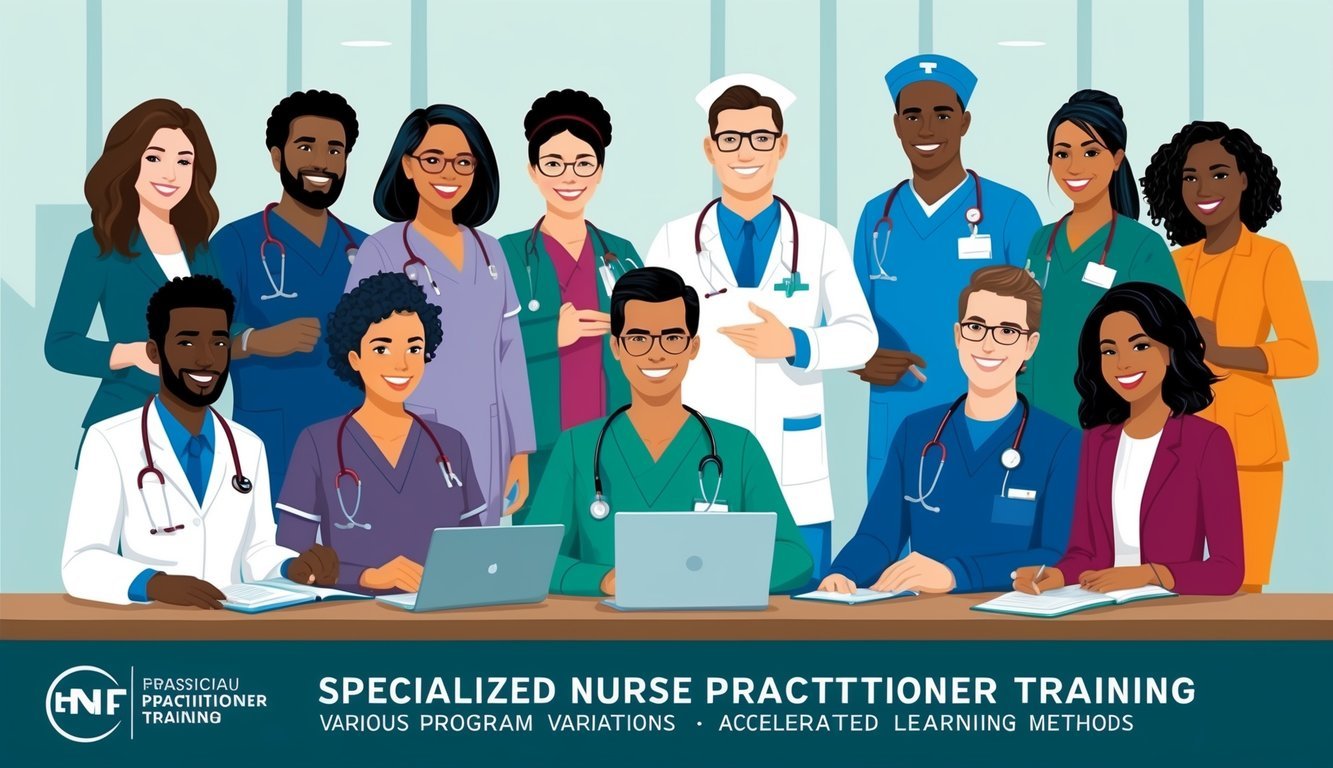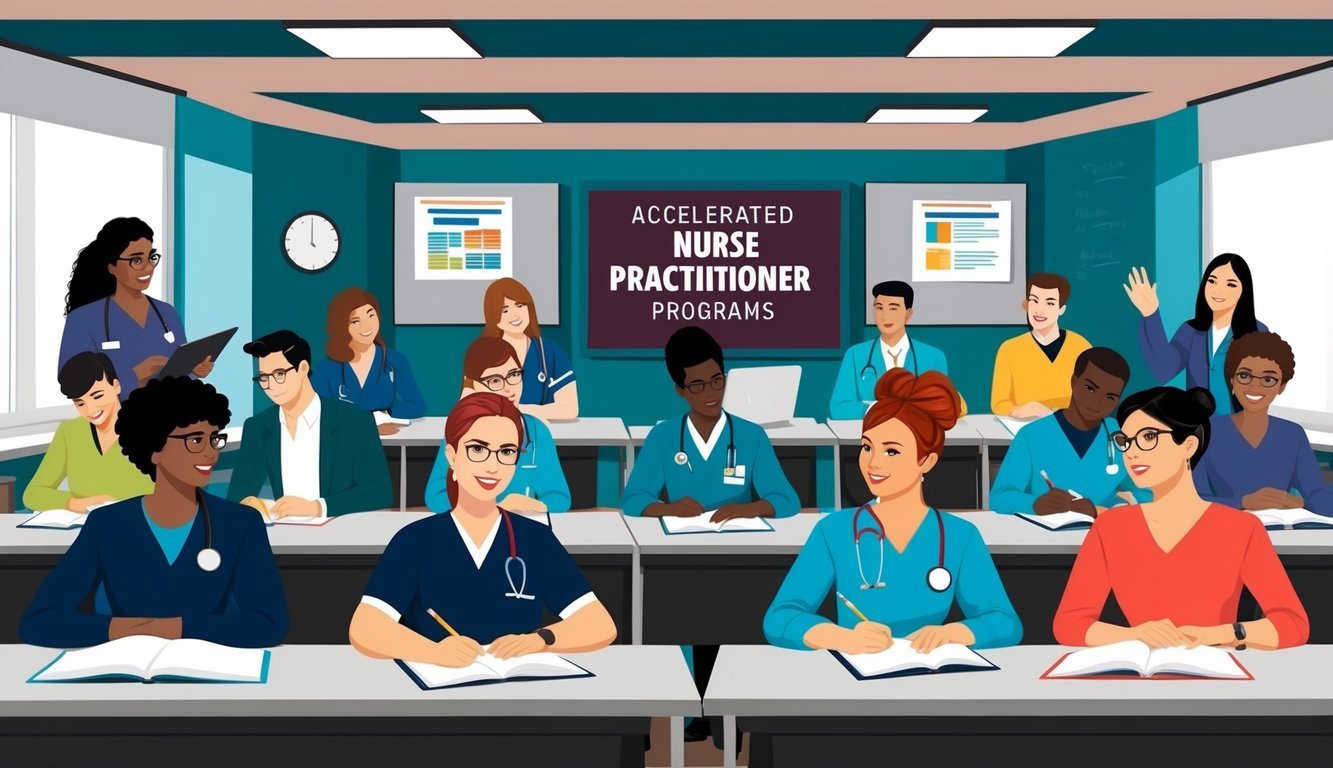Transitioning to a nursing career can feel daunting, especially if you come from a non-nursing background. But you can earn your degree and start practicing in a fraction of the time compared to traditional programs with accelerated nurse practitioner programs. These programs offer various pathways that cater to your previous education, enabling a smoother career change into the healthcare field.
You may wonder how these programs can fit into your busy life.
Many accelerated paths offer online options, flexible schedules, and comprehensive support to make your education as practical and accessible as possible.
By choosing an accelerated program, you can obtain the necessary skills and credentials more quickly, positioning you to enter a rewarding career as a nurse practitioner.
Exploring these options can lead you to a new and fulfilling profession, just by leveraging your existing bachelor’s degree.
With many universities offering tailored curricula and support systems, you have the opportunity to turn your passion for healthcare into a reality.
For more information on top programs available, consider visiting resources like NursingProcess or Nurse.org.
Overview of Accelerated Nurse Practitioner Programs
Accelerated nurse practitioner programs provide a fast-track path for those holding a bachelor’s degree in a non-nursing field to enter the nursing profession.
These programs are designed to equip you with the necessary skills and knowledge to become a licensed nurse practitioner (NP) in a shorter time frame than traditional routes.
Defining Accelerated NP Programs
Accelerated NP programs are designed for individuals seeking advanced practice nursing roles without prior nursing education.
These programs generally allow students with a non-nursing bachelor’s degree to transition into nursing through a comprehensive curriculum that combines theory and clinical practice.
Typically, these programs can be completed in 12 to 24 months, depending on the institution and course load.
The curriculum includes core nursing courses, clinical rotations, and specialized NP training.
Upon completion, graduates typically earn a Master of Science in Nursing (MSN) or Doctor of Nursing Practice (DNP) degree, qualifying them to sit for national certification exams.
Eligibility and Target Demographics
Eligibility for accelerated NP programs usually requires you to have a bachelor’s degree in a non-nursing field and meet specific prerequisites, such as coursework in anatomy, physiology, and microbiology.
Additionally, most programs may require relevant healthcare experience, such as volunteering or working in medical settings.
Target demographics primarily include individuals seeking career changes, often from sectors like education, business, or the sciences.
These programs cater to motivated learners eager to enter the nursing field quickly.
As a prospective student, you should explore various options to find a program that aligns with your career goals and personal circumstances.
For detailed program comparisons and information, you can check out the 6 Best Online Accelerated Nurse Practitioner Programs For Non-Nurses.
Curriculum and Coursework Essentials
In accelerated nurse practitioner programs, you will encounter a diverse curriculum that encompasses essential nursing foundations and specialized training.
This section provides insights into the core subjects, specialized coursework, and clinical experiences that are critical for your development as a nurse practitioner.
Core Nursing Subjects
Your curriculum will begin with core nursing subjects that establish a solid foundation.
Key subjects often include:
- Anatomy and Physiology: Understanding the human body’s structure and function is crucial.
- Microbiology: This course covers pathogens and their effects on health.
- Nutrition: Knowledge about nutrition helps in patient management.
- Developmental Psychology: This subject equips you to comprehend the psychological growth throughout the lifespan.
These courses typically require a combination of lectures and labs, providing a balance of theoretical knowledge and practical skills.
Most programs also include a focus on nursing education principles, ensuring you are prepared for both clinical practice and potential teaching roles.
Specialized NP Coursework
As you progress, your studies shift focus to specialized coursework tailored to your desired nurse practitioner track.
You may select from various pathways such as:
- Family Nurse Practitioner (FNP): Courses centered on family health, community health, and disease prevention.
- Adult-Gerontology Nurse Practitioner (AGNP): In-depth study of aging processes and care management for older adults.
- Psychiatric Mental Health Nurse Practitioner (PMHNP): Training in mental health assessments, diagnosis, and treatment planning.
These specialized courses often emphasize case studies, evidence-based practice, and advanced pharmacology.
The goal is to prepare you for certification exams and effective patient care in your chosen specialty.
Clinical Practicum and Experience
Clinical practicum experiences are vital, allowing you to apply theoretical knowledge in real-world settings.
These hours often require:
- Direct Patient Care: Engaging with patients under supervision to build hands-on skills.
- Mentorship: Working alongside experienced practitioners who guide your learning.
Programs typically mandate 500-750 clinical hours, depending on your specialization.
These hours ensure competency before certification.
You will focus on gaining experience in your specific area, such as family medicine or mental health settings.
Each clinical experience is designed to enhance your confidence and readiness for practice.
Navigating Certification and Licensure

Understanding the certifications and licensure requirements is critical for your transition into a nurse practitioner role.
You will need to meet specific benchmarks to ensure you are qualified to practice safely and effectively.
NCLEX-RN and RN Licensure
To practice as a registered nurse, you must pass the National Council Licensure Examination for Registered Nurses (NCLEX-RN).
This exam assesses your knowledge and skills needed for safe nursing practice.
The passing rate is typically around 85%, as it reflects both theoretical and practical nursing knowledge.
To apply for your RN license, you must:
- Complete an accredited nursing program.
- Submit an application to your state’s nursing board.
- Provide proof of graduation and background checks.
After passing the NCLEX-RN, you will receive your RN license, allowing you to start your nursing career.
Advanced Practice Registered Nurse Certification
Once you have your RN license, the next step is to pursue certification as an Advanced Practice Registered Nurse (APRN).
This includes various specialties such as nurse practitioner (NP), nurse anesthetist, clinical nurse specialist, or nurse midwife.
The certification process generally requires the following:
- Completion of a master’s or doctoral nursing program.
- National certification exam specific to your specialty area.
Each state has its own requirements for APRN licensure, so it’s essential to check with your state’s board of nursing for specific details.
National Certification Exams for NPs
As a prospective nurse practitioner, you must take a national certification exam relevant to your specialty.
Common certifications are offered by organizations such as:
| Certification | Organization |
|---|---|
| Family Nurse Practitioner (FNP) | American Association of Nurse Practitioners (AANP) |
| Adult-Gerontology Nurse Practitioner (AGNP) | American Nurses Credentialing Center (ANCC) |
| Pediatric Nurse Practitioner (PNP) | Pediatric Nursing Certification Board (PNCB) |
Passing these exams will grant you certification and authorize you to practice in your chosen specialty.
Ensure you stay updated on any continuing education requirements to maintain your certification.
Program Variations and Specializations

Accelerated nurse practitioner programs offer various tracks and specializations tailored to meet diverse patient needs.
Understanding these options can help you align your career goals with the right educational pathway.
Family, Pediatric, Psychiatric, and Adult-Gerontology Tracks
You can choose from several primary care tracks in accelerated nurse practitioner programs.
The Family Nurse Practitioner (FNP) track prepares you to provide comprehensive care for patients of all ages.
The Pediatric Nurse Practitioner focuses on children, covering both primary and acute care settings.
If you’re interested in mental health, the Psychiatric Mental Health Nurse Practitioner (PMHNP) track equips you to address psychiatric disorders across the lifespan.
On the other hand, the Adult-Gerontology Acute Care Nurse Practitioner track specializes in treating adult and elderly populations, emphasizing acute care management.
Each track requires specific coursework and clinical training to ensure proficiency.
Emergency and Women’s Health Specialties
Specializing in emergency care or women’s health can be highly rewarding.
An Emergency Nurse Practitioner role focuses on acute medical conditions, trauma, and critical situations.
You will gain skills to function effectively in fast-paced and high-stakes environments.
The Women’s Health Nurse Practitioner (WHNP) track is designed to meet the unique healthcare needs of women throughout their lifespan.
Training includes reproductive health, prenatal care, and gynecological conditions.
Both specialties require additional clinical hours and may involve unique certification exams, ensuring you are well-prepared for your chosen field.
Online and On-campus Formats
You have the option to pursue your accelerated nurse practitioner education in various formats. Online programs provide flexibility, allowing you to balance work and study while accessing comprehensive curricula.
Many institutions offer hybrid models incorporating both online and on-campus components.
On-campus formats often facilitate direct access to faculty and hands-on training through in-person clinical practice.
When choosing between online and on-campus options, consider your learning style, schedule, and location preferences.
Various programs, such as those at University of Rochester and others provide both online and in-person tracks to fit diverse needs.
Institutions Offering Accelerated NP Programs
Accelerated Nurse Practitioner (NP) programs are available at several esteemed institutions, designed specifically for individuals with non-nursing bachelor’s degrees. These programs provide you with the opportunity to earn a graduate nursing degree swiftly.
Renowned Universities and their NP Programs
Several universities are recognized for their outstanding accelerated NP programs:
| University | Program Highlights |
|---|---|
| Vanderbilt University | Offers a highly competitive Direct Entry MSN program focusing on family practice. |
| Ohio State University | Known for its Accelerated BSN to DNP program, which you can complete in under three years. |
| Yale University | Provides a unique program that empowers you to gain leadership skills along with clinical expertise. |
| Emory University | Features an online Master’s program with optional on-campus experiences tailored for non-nurses. |
| Marquette University | Offers an accelerated program allowing you to earn an MSN within 16 months. |
| University of Cincinnati | Provides a five-semester pathway to an MSN degree for non-nurses. |
| Herzing University | Features flexible options with both online and on-campus learning opportunities. |
These institutions not only ensure a robust education but also prepare you for the increasing demands in healthcare.
Admission Criteria and Considerations
To gain admission into these programs, you generally need to meet specific criteria, which can vary by institution.
Common requirements include:
- A bachelor’s degree (Bachelor of Arts or Bachelor of Science) from an accredited institution.
- A minimum GPA, often set at 3.0 or higher.
- Recommendation letters from academic or professional references.
- A personal statement outlining your motivation and career goals in nursing.
Some programs may also need you to have relevant experience in the healthcare field or prerequisite coursework.
Be sure to review each university’s requirements thoroughly to better prepare your application and avoid any missing elements in the process.

